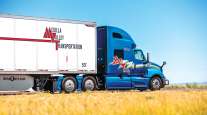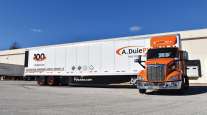Special to Transport Topics
An Immigrant’s Long Journey to Freedom Leads to Trucking
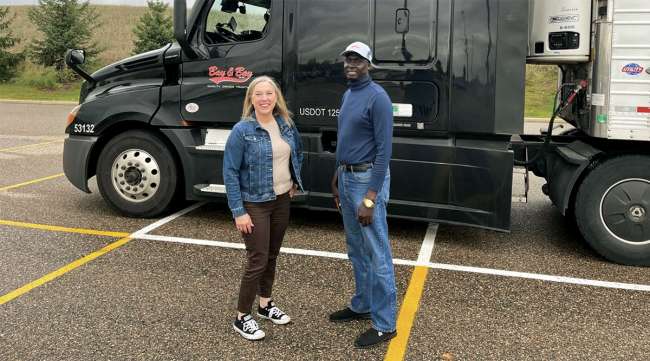
[Stay on top of transportation news: Get TTNews in your inbox.]
For Sudan-born Lual Akoon, now a 46-year-old independent owner-operator out of Eagan, Minn., the memories of his childhood half a world away are still fresh.
Growing up near the South Sudan city of Aweil, he remembers being “a happy child at home.” His family lived in a small village and made ends meet through farming and raising livestock.
Then the second Sudanese Civil War broke out in 1983, and his village came under attack.
“They burned down everything we had, killed our livestock, took people and enslaved them,” Akoon said.
Many of his family members and fellow villagers were lost or killed.
See the 2024 Top 100 rankings
►Freight Recession Squeezing Carriers
►Fleets Persevering in Down Market
►An Immigrant's Journey to Trucking
►A. Duie Pyle's Centennial
►Interactive Map
►Sector Lists Reflect Market Weakness
Sector Rankings
LTL | TL/Dedicated
Intermodal/Drayage
Motor Vehicle/Driveaway
Tank/Bulk | Air/Expedited
Refrigerated | Flatbed/HS
Package/Courier | Mail
Household Goods/Commercial
Still a young boy, he ran away, and with hundreds of other children from his village and region, mostly boys, escaped with the help of the Sudanese People’s Liberation Army, which was fighting against the government in what would become one of Africa’s cruelest wars.
A Treacherous Journey
Akoon’s journey, along with some 20,000 other displaced refugees now orphaned as young children who fled their homeland in search of safety, became the subject of a 2003 documentary, “Lost Boys of Sudan.”
The documentary chronicled the lives of these “lost boys” and what would turn out to be a treacherous 1,000-mile, yearslong journey from one refugee camp to another, mostly by foot, through Sudan, to Ethiopia and eventually to Kenya.
As reported in the documentary, thousands of boys perished as the refugees traveled through war zones and endured devastating hunger, dehydration and exhaustion, while some were attacked and killed by wild animals or drowned in dangerous river crossings.
“I was fortunate, my brother taught me to swim at an early age,” Akoon said.
The refugees settled for a time at a camp in Ethiopia, where Akoon had some of his first formal education. War then broke out in Ethiopia, so his journey continued to Kenya, where by 1992 some 10,000 refugee boys between the ages of 8 and 18 had settled at the Kakuma refugee camp.
With the war in Sudan still raging, returning to their homeland wasn’t an option, so the United Nations relief agency petitioned for and obtained U.S. State Department approval for some 3,500 refugees — Akoon among them — to be resettled in the United States. The process ran from 1996 through 2005.
Akoon remembers the exact day he came to the U.S.
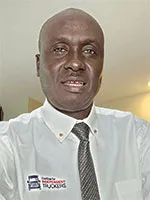
Akoon
“It was June 17, 1999,” he said. “I landed in Des Moines, Iowa, in full African dress.”
Within a few weeks he was settled and found a job in nearby Ames at a packing house putting toppings on pizzas and packaging them. He also enrolled in community college. He married in 2004 and eventually welcomed three sons and two daughters.
When South Sudan gained its independence in 2011, he returned to his home country, however briefly.
“I wanted to witness the flag of my country raised for the first time,” he said proudly. “As someone who lost friends and family in the wars, got shot and nearly died, I could not let that day, July 9, 2011, go by without being there.”
Standing in a crowd not more than 10 feet from where newly independent South Sudan’s flag was raised, he experienced an emotional, personal moment, witnessing freedom being restored for his countrymen — and those who perished for that freedom honored and remembered.
Finding Opportunities In the Trucking Industry
Returning to the U.S., Akoon moved to Eagan, Minn., at the suggestion of a friend who said he might find better opportunities to support his family.
His initial introduction to trucking was as an Amazon delivery driver for a few months, then he applied with truckload carrier CRST for its driver training school. He was accepted, completed the course, successfully passed his monthlong on-road testing with a driver trainer and obtained his commercial driver license.
His trucking career took off from there, subsequently driving for Transport America — where he became a driver instructor — and CFI, where he again did over-the-road truckload runs.
In 2022, Akoon got a call from Bay and Bay Transportation, which offered him a job as a company driver. He accepted and joined their team.
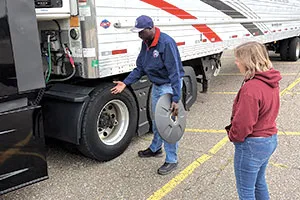
Akoon demonstrates a pre-trip safety inspection for Minnesota Rep. Erin Koegel. (Minnesota Trucking Association)
He later explored the opportunity to become an owner-operator. Deciding to branch out on his own, he first leased a truck before purchasing his current 2021 Freightliner Cascadia and began building his business as an independent contractor hauling loads for Bay and Bay, among others.
Advocating for the IC Model
More recently, Akoon has taken on an additional role — industry advocate.
Last year, he became a spokesman for independent drivers through an “ambassador” program launched by the Coalition for Independent Truckers, a trade group focused on protecting the trucking industry’s independent contractor business model.
This ambassador program recruits and trains owner-operators to serve as advocates who can provide context and counterpoint to state legislative efforts designed to reclassify independent contractors as trucking company employees.
“We needed a program that really trained and enabled independent contractors to speak for themselves and credibly explain the important issues of maintaining the model,” Minnesota Trucking Association President John Hausladen said.
At the same time, the program could not ask potential participants to take time away from their business — and lose revenue — just to be an advocate.
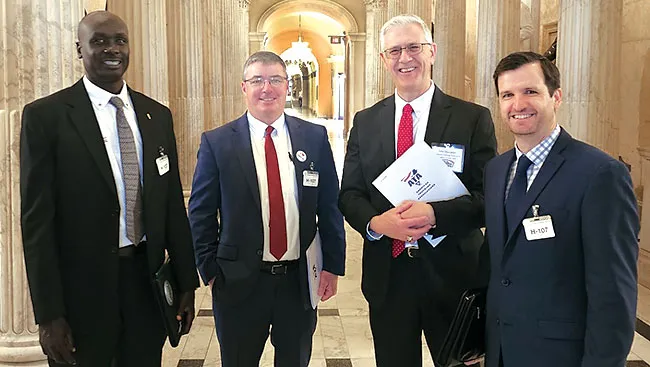
Akoon (left) and MTA’s Hausladen (second from right) participate in an event in Washington, D.C. (Minnesota Trucking Association)
“ICs are a small business on wheels. Any time they take time from being on the road they are literally losing money,” Hausladen explained. “The genius of the ambassador program, outside of the training, is it creates the funds that allow the driver to do it.”
When spending time on advocacy activities, such as taking legislators on ride-alongs, speaking at state legislative hearings or meeting members of Congress in Washington, they receive a financial remuneration to cover the average amount of revenue they would earn per day driving their truck, Hausladen said. The program also covers travel expenses.
In considering who to tap for the program, Hausladen reached out to members of the state association for recommendations. Bay and Bay nominated Akoon.
Hausladen, who knew of Akoon’s story, was a big fan.
“As a person, a professional truck driver, a businessman, a family man and someone who’s overcome unimaginable hardship, he was the embodiment of what an independent contractor can really do,” he said.
Akoon accepted, went through the program’s training, and last June became the first of five Minnesota-based ICs to join the program.
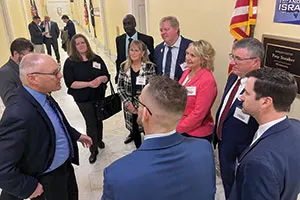
Akoon participates in a meeting with Rep. Pete Stauber during a Call on Washington event. (Minnesota Trucking Association)
Hausladen came up with the idea of pitching government leaders on a one-hour ride with an independent contractor to see the business firsthand.
“Lual was the first one we tried,” he recalled. “He took a legislator for a ride around his district. They had a chance to learn from a real truck driver about the business, its issues and challenges [such as the scarcity of truck parking] and how they could help.”
The ride-along experience can be a “fun field trip” for legislators, Hausladen said, noting that participants come from both sides of the political aisle.
It’s About Freedom
As an immigrant, and someone whose liberties were torn away at a very young age, Akoon sees the issue of independent contractors and efforts to reclassify them through a very clear lens: preserving freedom.
“To me, the American dream is whatever I choose to do by my own hand, my own hard work, on my own or with others, to make a living and take care of my family,” he said. “It is the freedom to make a choice.”
In his ride-alongs with legislators, he would ask them, “Is the American dream only for a certain type of person or job, or something anyone can hope for, dream for, strive for?”
Want more news? Listen to today's daily briefing above or go here for more info
“I live in my truck. Most of us have extended families we are providing for,” he said. “So I tell them the freedom of what I am doing now needs to be preserved, needs to flourish. This truck is our American dream.”
He is proud to represent the tens of thousands of other ICs who deliver a service and provide capacity to haul freight that keeps the economy moving.
He believes the ambassador program is working. The legislators he speaks with come away with a different perception of the business and an understanding they didn’t have before. Whether they act on that, of course, is another story, Akoon said.
And he has a vision for the future.
“I want to build a company, have more than one truck,” he said. “I see myself doing that. I see my son joining the business. It’s a legacy I want to leave for him.”



